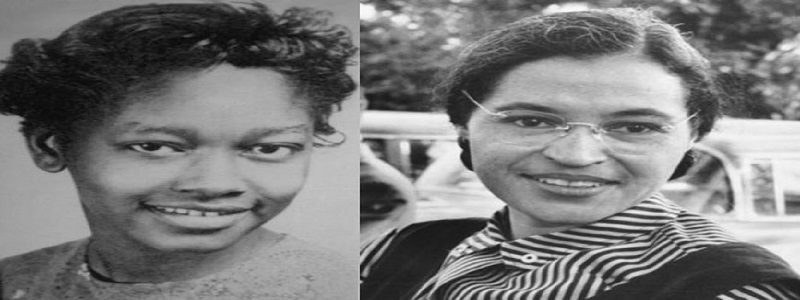
Claudette Colvin, Civil Rights History, and Argument-Based Dramatic Interpretations
Overview
The National Book Award winning biography, Claudette Colvin: Twice Toward Justice (Macmillan, 2009), by Phillip Hoose, tells the story of a relatively unknown figure in the early Civil Rights Movement. In March of 1955 Claudette Colvin, then fifteen, enacted Montgomery, Alabama’s first bus protest, refusing to give up her seat to a white woman. She was arrested, spent several hours in jail, and was fined. Her classmates and community didn’t know exactly how to react to what she did at first – it was a spontaneous act of angry protest – though within the next nine months the bus boycott became a reality. Civil rights leaders, including Dr. Martin Luther King, Jr., chose Rosa Parks to be the figurehead of the bus boycott, for various reasons that the biography touches upon, and the rest is history. The struggle of the bus boycott is described in the book, as well as its eventual success. Claudette Colvin was one of four women caused direct harm by the Jim Crow laws that segregated buses and for that reason she was named as one of the plaintiffs in the case Browder v. Gayle (1956). Browder was a major victory for the Civil Rights Movement when the federal district court decision was affirmed by the U.S. Supreme Court in November, 1956: it struck down Jim Crow laws as unconstitutional in a parallel manner to Brown v. Board of Education’s undercutting of “separate but equal” public schooling, two years earlier.
Rosa Parks is a renowned historical figure, whose name recognition is extremely high, as are other civil rights leaders involved in the Montgomery bus boycott, including Ralph Abernathy, E.D. Nixon, and of course, Martin Luther King. Claudette Colvin – certainly until the 2009 publication of her award-winning biography, but even continuing since then – is a far less well-known and admired figure in the Civil Rights Movement. At the center of her biography is a question about to what extent Claudette Colvin has been unjustly overlooked in the history of the movement in America, and why history may have made the choice it has to elevate Rosa Parks and others and not her.
This project will use dramatic interpretations of incidents and scenes from Twice Toward Justice to illustrate theatrically arguments on either or both sides of the debatable issue:
Has Claudette Colvin been unfairly treated by history?
Students will work in groups to write and then perform short scripts that flesh out and color in key moments from the life of Claudette Colvin. These scripts, and their performances, will project arguments for an overall position on the debatable issue. As with argumentation in more common argumentative formats, student groups can acknowledge the force of a counter-argument to their position, though their stance should in the end be discernible by the audience.
Method and Procedure
These steps should be followed after the class has read Claudette Colvin: Twice Toward Justice.
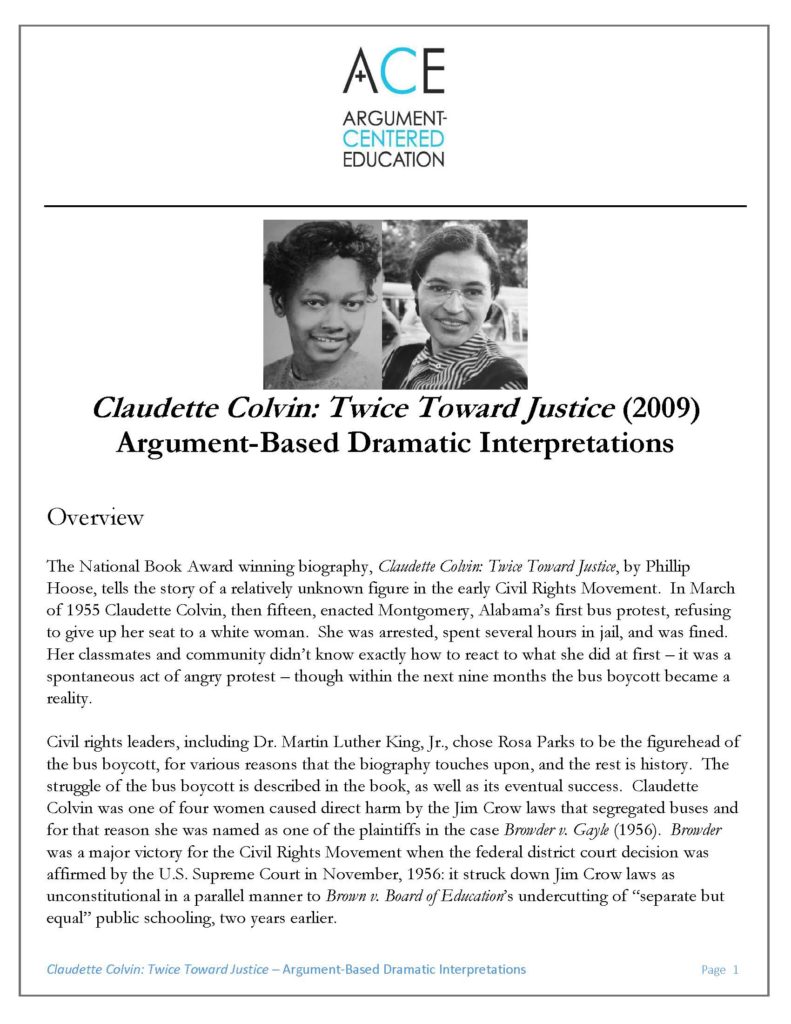
(1)
Orient students on the full Claudette Colvin: Twice Toward Justice Argument-Based Dramatic Interpretations project. Introduce and explicate the significance of the debatable issue. Show the author’s video for the book.
(2)
Divide the class into groups (or “troupes”) of four or five students. Identify a director and a writer in each troupe. The director will have responsibility for guiding the students in the troupe to accomplish all required tasks, and will have chief decision-making responsibility for the performance that the troupe puts on. The writer will have responsibility for ensuring that the scripts get written out fully and legibly, and for turning the scripts in.
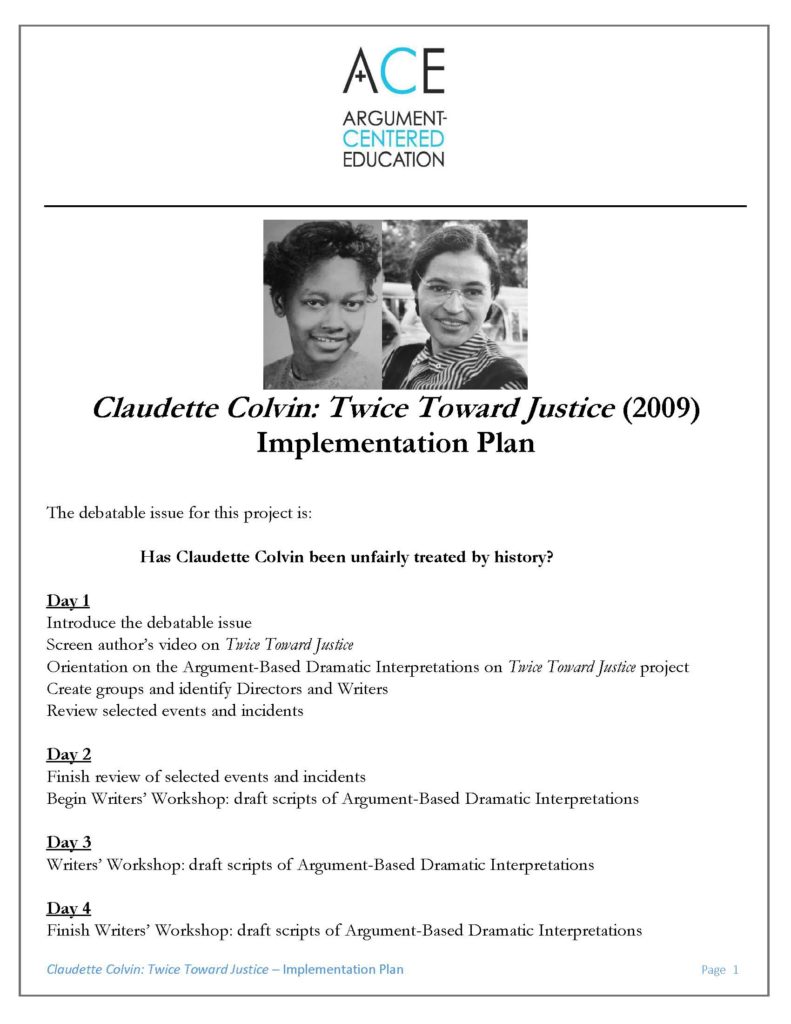
(3)
Work through each of the items in the Selected Events and Incidents document, asking each troupe to formulate two argumentative claims in response to each event or incident, that the event or incident might support. The troupe should also include reasoning that explains how the event or incident supports the argumentative claim.
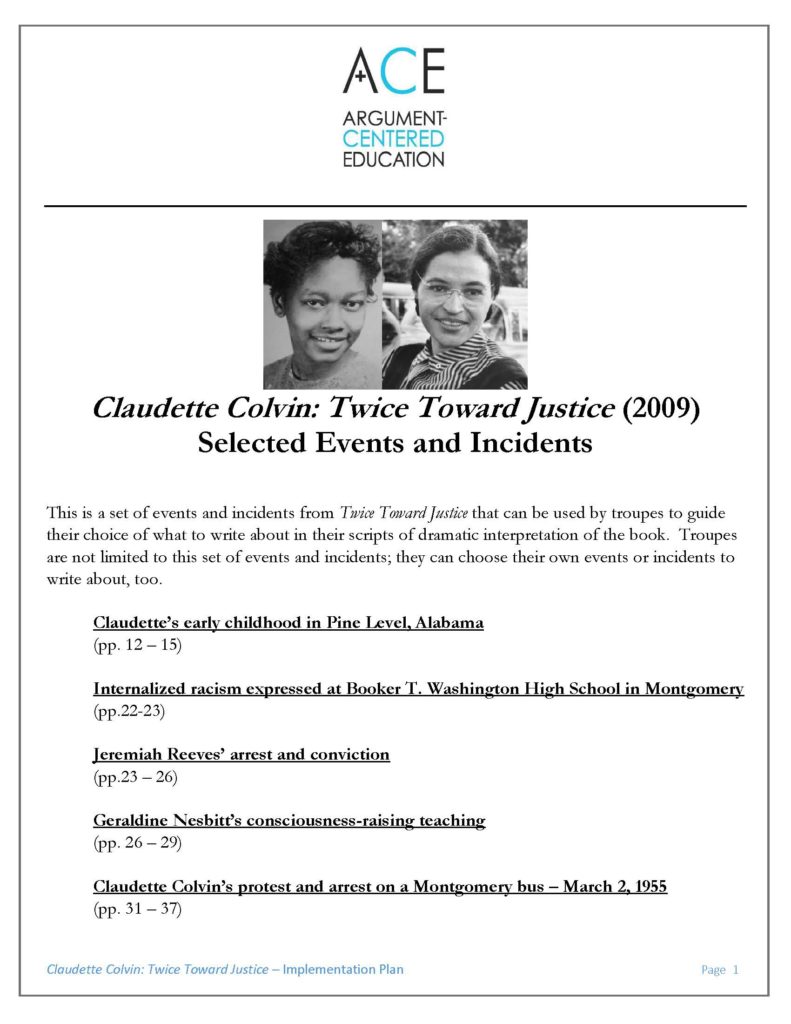
(4)
Tell the troupes that their task now is to write a 2 – 3 minute script for each of three events or incidents in Twice Toward Justice. Troupes can choose from the selected set, or they can choose their own. All members of the troupe should be involved in writing each script, even though the writer will be responsible for the physical writing (or keyboarding).
(5)
Scripts can involve any number of characters from the biography, though they will probably want to focus on choosing characters from this list of central players:
Claudette Colvin
Mary Ann Colvin
Mayor “Tacky” Gayle
Fred Gray
U.S. Federal Court Judge Frank M. Johnson
Martin Luther King, Jr.
E.D. Nixon
Rosa Parks
Each character in a script should be assigned a troupe member who will act the part. Troupe members can and should play more than one character; they can even do so in the same script.
(6)
Each troupe should be charged with choosing any three argumentative claims — they can choose two from one side and one from the other, for instance. (This is important: the argumentative claims do not need to be all on one side of the issue. But because troupes are choosing three, a majority will be on one side or the other.) The claims should be supported by evidence from the text that they include in their script and their performance, though their script can infer from and reasonably project beyond the actual textual details. In other words, troupes can imagine what happened between what is explicitly described in the text, as long as their imaginative projection is justified by what is in the text. Students can go beyond the text by inferring dialogue and actions that might have been suggested by the text.
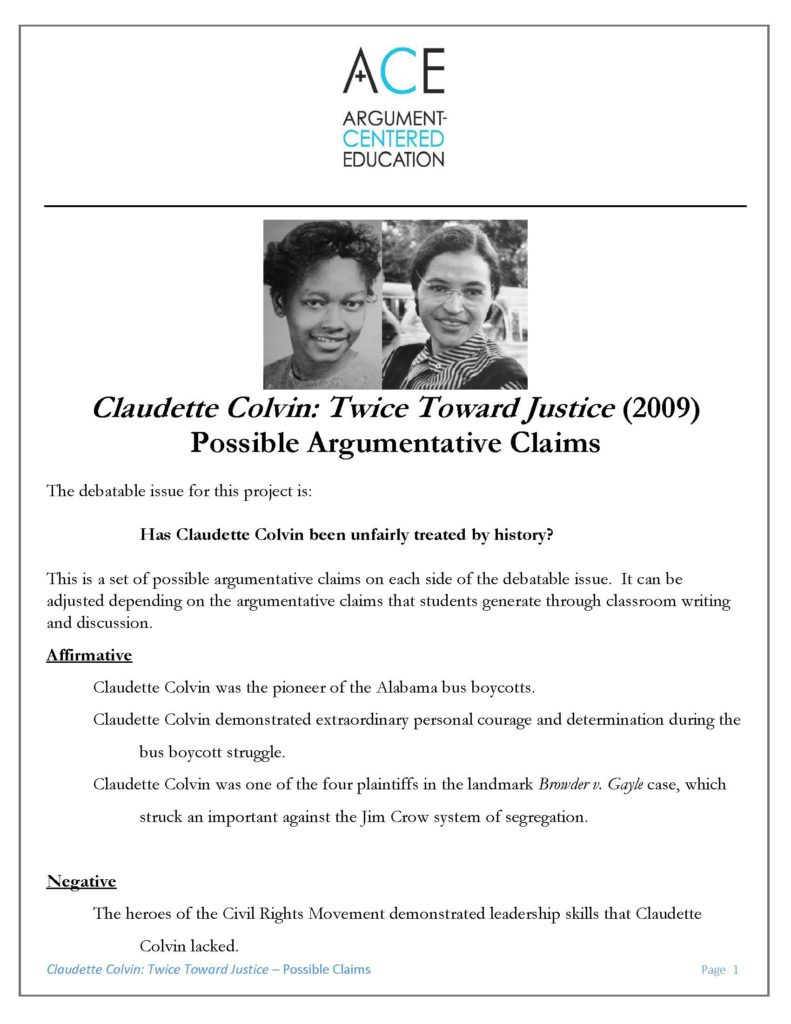
(7)
After several class periods of writers’ workshop, troupes should turn in their scripts for a formative assessment grade. They should get feedback on their scripts. That feedback can be given using classroom-wide “analytics” – patterns of proficiency and deficiency noted among the scripts and delivered using student writing samples supporting each bullet point – or individual commentary on each script, or both. Students should then have time to revise their scripts, in response to the feedback.
(8)
Now the class is ready for the argument-based dramatic interpretations. Each troupe should perform their three scripts in chronological succession (unless they have a thematic reason for modifying the order).\
(9)
After each troupe’s full performance the rest of the class will discuss what argumentative claims the scene(s) included and how credible and sufficient the backing for the claim(s) was in the performance. To prompt that discussion students should complete a Response Form on each performance. Audience members should complete as much of the form as they can during the performance. They will use their comments on it as notes for the discussion. Then after the discussion they should get a little time to complete the form and turn it in at the end of the class period as an exit ticket. Troupes should also submit their final scripts as part of their final assessment on the project, as well. For the summative assessment grade, 50% should be based on the performance and 50% should be based on the troupe’s final written scripts.
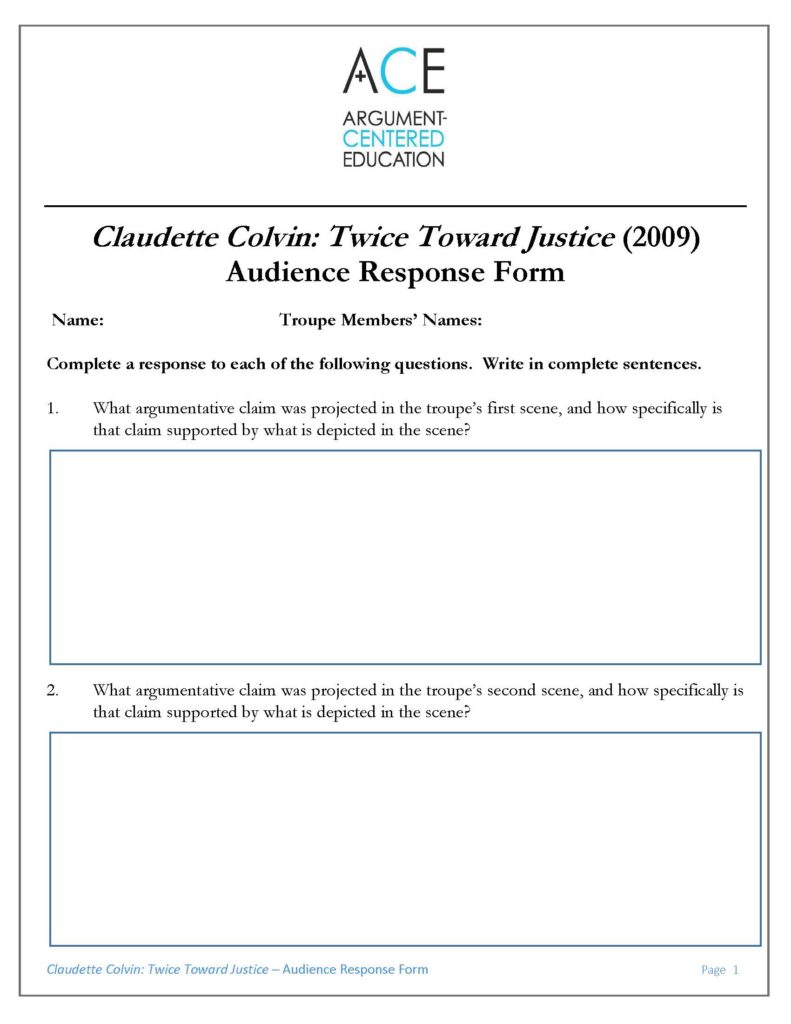
(10)
When the performances have all been completed, conduct a reflective discussion on the debatable issue. What have the students learned about how history has treated Claudette Colvin? What have they learned about what traits Civil Rights Movement leaders, and then historians, valued and disvalued? In what ways has this project changed student thinking about Claudette Colvin? In what ways has it reaffirmed and deepened views that they have had throughout?

